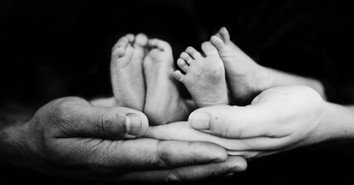Parents & homosexuality: Don’t try this at home

Last week, Chuck Colson used his Breakpoint radio show and columns to promote the theory that one can prevent homosexuality by altering parent-child relations. To prevent male homosexuality, Colson wrote that “early intervention, in which the boy’s father learns how to be both strong and caring, will interrupt an unhealthy mother-son bond.” In other words, according to Colson, troublesome parent-child relationships are at the root of homosexuality.
Colson based his program on a book by Joseph and Linda Nicolosi titled, A Parent’s Guide to Preventing Homosexuality. In their book, the Nicolosis assert that gender norms should be reinforced and fathers should help boys develop a strong sense of masculinity. In his talks on the subject, Nicolosi says that fathers and mothers play differently with their children and he lauds the rougher manner of fathers. For instance, in a 2006 talk on the roots of male homosexuality, I heard Nicolosi describe how some fathers playfully toss their infant sons in the air. Nicolosi then joked that if the father did not catch his son and the infant felt and cracked his head, that the son might have brain damage but “at least he won’t be gay.”
Despite the “joke,” some of the advice in A Parent’s Guide is tame, advising same-sex parents to form warm bonds with their children. More controversial is that fact that the authors offer their recommendations with the assumption that identification with the same sex parent will offset development of same-sex attraction. While most researchers now doubt that parenting has much to do with sexual orientation, the Nicolosis cite some professional research support. Over twenty times, the book cites the research or approval of George Rekers. In fact, the lone professional recommendation for the book on Amazon.com comes from Rekers. He opines:
"Every concerned parent will benefit from this practical parenting advice on how to help a child develop a secure gender identity that leads to a normal heterosexual orientation in adulthood. Joseph Nicolosi is an internationally recognized professional expert on therapies that promote normal heterosexual adjustment…Their book provides clear guidance on what parents can do to promote their child’s sexual adjustment." (George A. Rekers, Ph.D., professor of neuropsychiatry and behavior science, University of South Carolina School of Medicine )
Rekers was a co-founder of the Family Research Council and until a year ago, on the board of the National Association for the Research and Therapy of Homosexuality (NARTH), a group dedicated to treating homosexuality, and one co-founded by Nicolosi. However, in 2010, Rekers was caught returning home from a European vacation with a young man he hired from a gay escort service. Apparently the prevention interventions had not worked well in Rekers’ case.
Although Rekers resigned from NARTH and faded from public view, his treatment recommendations are still cited on the organization’s website. Rekers views also are prominently referenced in A Parent’s Guide which Chuck Colson is recommending on his Breakpoint website. In their book, the Nicolosis write
Dr. George Rekers, a nationally known expert on sexual disorders, writes that “gender nonconformity in childhood may be the single most common observable factor associated with homosexuality.” And there is considerable evidence, he asserts, that the child with a gender-identity problem can resolve the difficulty – with or without psychiatric intervention. Rekers reports, “In a sizable number of cases…the gender-identity disorder resolves fully.” (pp. 15-16)
In light of a series of new reports, parents should reconsider advice based on Rekers’ recommendations. This week (June 7-9) CNN’s Anderson Cooper will feature the aftermath of one of the cases which Rekers said was fully resolved. The dark side of this story is a young man, Kirk Murphy, who endured behavior modification to prevent homosexuality. As an adult, Murphy ended his life at 38. During the CNN series, his surviving families revisit the treatment led by George Rekers at UCLA. Another comprehensive narrative of the case is available from Box Turtle Bulletin.
The CNN report describes behavior modification where the five year-old Kirk was reinforced for playing with stereotypically masculine toys like guns or knives, while being discouraged from playing with dolls or jewelry. According to the family members, the reinforcement turned violent at home, with aggressive spankings for performance which did not match the therapist’s protocols. Indeed, the original report by Rekers and his advisor Ivar Lovaas described what parents were supposed to do when Kirk did not respond appropriately. Among other things, parents were to implement
a timeout procedure (e.g., sitting isolated in a corner, being deprived of TV time), or physical punishment by spanking from the father.
In their book, A Parent’s Guide, the Nicolosis refer to Kirk as an illustration of Rekers success story. The following description is from Rekers 1974 paper on Kirk’s treatment:
When we first saw him, the extent of his feminine identification was so profound (his mannerisms, gestures, fantasies, flirtations, etc., as shown in his "swishing" around the home and clinic, fully dressed as a woman with long dress, wig, nail polish, high screechy voice, slovenly seductive eyes) that it suggested irreversible neurological and biochemical determinants. At the 26-month follow-up he looked and acted like any other boy. People who view the videotaped recordings of him before and after treatment talk of him as "two different boys". (p. 38)
Rekers built his career on cases like Kirk’s and others like Nicolosi have used these studies as evidence for the efficacy of their recommendations to parents. As the reports point out, what the doctors reported was at odds with what the family recalls, and may, in some cases, have adverse effects. At the least, parents should exercise caution and ask for additional evidence and get other opinions when considering how to respond to children who display gender non-conforming actions and preferences.
Originally published June 07, 2011.





